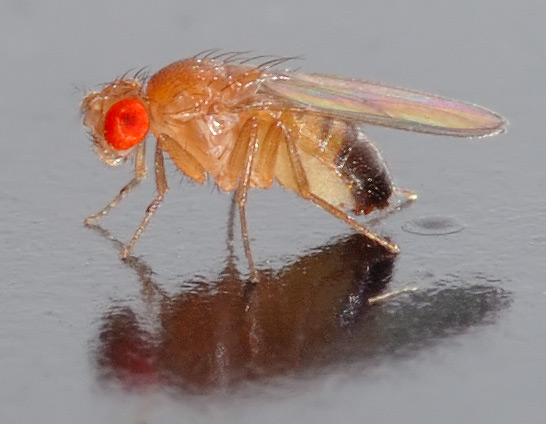
From ScienceDaily:
A provocative study by evolutionary biologists takes on one of Charles Darwin’s central ideas: that males adapt and compete for the attention of females because it is the females who ultimately choose their mates and the time of mating.
Instead, new research using fruit flies as a representative species indicates that females do not have specific preferences, suggesting that 150 years of evolutionary theory around mating choice may need to be tossed out.
“Darwin’s female-choice theory has become the foundation for explaining the presence of exaggerated secondary sexual traits in many males, such as the peacock’s tail feathers,” says evolutionary biologist Rama Singh, an author of a paper in the journal PLOS ONE that explains the findings.
“It has also led to a cottage industry based on the idea that female choice is based on the genetic quality of the males, known as the ‘good gene hypothesis’,” Singh says. “Sexually exaggerated traits are said to be male advertisements to females of their good genes, when in fact they may simply be a means of making the male more visible to females or intimidating other males.”
…
Singh and his co-authors designed a simple trick to answer these questions. Using a garden variety of fruit fly, Drosophila, they sexually aroused a female with a male (large or small), then removed the male and offered the female two fresh males — one small and one large. The results were clear-cut and unambiguous: the aroused females did not show any particular preference for large males and mated as if randomly, leading the authors to conclude that once sexually aroused, females have no preference in terms of mates.
The key to understanding the question of choice may be in the longer time it takes female fruit flies reach a state of arousal — a lag that is often misinterpreted as females exercising mate choice. More.

Things must be changing if evolutionary biologists would even conduct such a study. Weren’t they just supposed to not ask?
See also: Can sex explain evolution?
Follow UD News at Twitter!
Here’s the abstract:
The mating success of larger male Drosophila melanogaster in the laboratory and the wild has been traditionally been explained by female choice, even though the reasons are generally hard to reconcile. Female choice can explain this success by virtue of females taking less time to mate with preferred males, but so can the more aggressive or persistent courtships efforts of large males. Since mating is a negotiation between the two sexes, the behaviors of both are likely to interact and influence mating outcomes. Using a series of assays, we explored these negotiations by testing for the relative influence of male behaviors and its effect on influencing female courtship arousal threshold, which is the time taken for females to accept copulation. Our results show that large males indeed have higher copulation success compared to smaller males. Competition between two males or an increasing number of males had no influence on female sexual arousal threshold;—females therefore may have a relatively fixed ‘arousal threshold’ that must be reached before they are ready to mate, and larger males appear to be able to manipulate this threshold sooner. On the other hand, the females’ physiological and behavioral state drastically influences mating; once females have crossed the courtship arousal threshold they take less time to mate and mate indiscriminately with large and small males. Mating quicker with larger males may be misconstrued to be due to female choice; our results suggest that the mating advantage of larger males may be more a result of heightened male activity and relatively less of female choice. Body size per se may not be a trait under selection by female choice, but size likely amplifies male activity and signal outputs in courtship, allowing them to influence female arousal threshold faster. (Public access) – Santosh Jagadeeshan, Ushma Shah, Debarti Chakrabarti, Rama S. Singh. Female Choice or Male Sex Drive? The Advantages of Male Body Size during Mating in Drosophila Melanogaster. PLOS ONE, 2015; 10 (12): e0144672 DOI: 10.1371/journal.pone.0144672